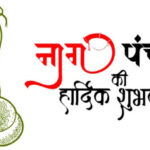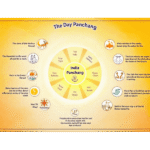In today’s world of stress, anxiety, and emotional imbalance, more people are turning to traditional systems of wellness and wisdom. One such ancient system is the Panchang—the traditional Hindu calendar based on Vedic astrology. While modern science has only recently acknowledged how lunar cycles might influence human behavior, ancient Indian texts have long documented the connection between cosmic timing and the human psyche.
Can the Panchang really influence your mental health?
Is your mood just a result of psychology, or is it also a reflection of cosmic rhythms?
In this blog post, we will explore the deep connection between Panchang and mental health, examining how elements like Tithi (lunar day), Nakshatra (constellation), and Karana (half-day) might affect your mood, behavior, and mental wellness.
What is the Panchang?
Panchang literally means “five limbs” in Sanskrit. It is a Vedic almanac used to determine auspicious and inauspicious timings. The five key elements of a Panchang are:
Tithi – Lunar day
Vaar – Day of the week
Nakshatra – Lunar constellation
Yoga – A specific combination of Tithi and Nakshatra
Karana – Half of a lunar day
These five elements are believed to influence both cosmic and human energies. By understanding these cosmic components, one can tune daily activities—including mental and emotional management—with the natural flow of time.
Ancient Wisdom: Mind and Moon Connection
In Vedic astrology, the Moon (Chandra) is considered the Karaka (significator) of the mind. It governs your emotions, memory, instincts, and intuition. The Moon’s phase (Tithi), its position in different Nakshatras, and its relationships with other planets are all believed to impact mental health.
This aligns with modern observations where moon phases are known to affect human behavior, especially in individuals with mental illnesses, sleep disorders, or hormonal imbalances.
How Panchang Elements May Affect Your Mood
Let’s break down how each component of the Panchang may influence mental and emotional health:
1. Tithi (Lunar Day) and Mood
Each Tithi corresponds to a specific phase of the Moon and carries a unique energy that can influence human behavior.
Shukla Paksha (Waxing Moon): Generally associated with growth, clarity, and positivity. Mental energy tends to increase.
Krishna Paksha (Waning Moon): Associated with introspection, withdrawal, and emotional cleansing.
Some Tithis like Amavasya (New Moon) and Purnima (Full Moon) are particularly potent.
Amavasya: Can cause mental fog, confusion, or depression in some individuals.
Purnima: Known for heightened emotional sensitivity, excitement, or even insomnia.
Understanding your personal Tithi and observing the day’s Tithi can help plan activities and prepare mentally for emotional highs and lows.
2. Nakshatra (Lunar Constellation) and Personality Influence
There are 27 Nakshatras in Vedic astrology, each symbolizing a particular set of traits, psychological patterns, and mental tendencies.
For example:
Ashwini Nakshatra: Quick, enthusiastic, but may suffer from impatience.
Rohini Nakshatra: Emotionally deep and sensual, but can be possessive.
Ardra Nakshatra: Intellectually sharp but prone to emotional turbulence.
Your birth Nakshatra reveals your mental blueprint, while the daily Moon Nakshatra indicates the day’s dominant emotional vibe. Knowing this can help:
Avoid conflict on emotionally sensitive days.
Focus on self-care when emotional triggers are more likely.
Use high-energy days for social or creative activities.
3. Karana and Mental Stability
Karanas are half-day periods in a lunar month that influence how an action taken at that time will manifest.
Some Karanas, like Bava, Balava, and Kaulava, are favorable and encourage mental clarity and cooperation. Others, like Vishti (Bhadra), are considered inauspicious and may lead to restlessness, confusion, or poor decision-making.
Avoid starting new mental health routines or emotional conversations during Vishti Karana if possible.
4. Yoga (Combination of Tithi + Nakshatra)
There are 27 Yogas in the Panchang. Some, like Siddhi Yoga or Amrita Yoga, are highly beneficial and promote positivity and emotional balance. Others, like Vyatipata and Vaidhriti, can create inner tension, confusion, or miscommunication.
By aligning your emotionally significant activities (like therapy sessions, spiritual practice, or journaling) with favorable Yogas, you can amplify healing effects.
5. Vaar (Weekday) and Planetary Influence
Each day of the week is ruled by a planet, which influences that day’s emotional tone.
Monday (Moon) – Emotional sensitivity; good for self-reflection or healing.
Tuesday (Mars) – Assertive energy; risk of anger or agitation.
Wednesday (Mercury) – Mental clarity; good for communication and analysis.
Thursday (Jupiter) – Optimism and learning; good for counseling or teaching.
Friday (Venus) – Emotional bonding; ideal for relationship healing.
Saturday (Saturn) – Slow and heavy energy; brings discipline but also melancholy.
Sunday (Sun) – Confidence; good for leadership or inner work.
By understanding the weekday ruler, you can mentally prepare for emotional themes and plan mental health routines accordingly.
Real-Life Applications of Panchang in Mental Wellness
✅ Mindful Scheduling
Use the Panchang to schedule tasks aligned with cosmic energies:
Avoid emotionally difficult decisions on Amavasya.
Plan introspective practices on Krishna Paksha days.
Start new habits or mental health programs on Shukla Paksha Tritiya or Panchami.
✅ Emotional Journaling
Track your emotions with the daily Tithi and Nakshatra:
Maintain a journal with columns: Date, Tithi, Nakshatra, Mood, Energy Level.
Patterns will help you predict your own emotional ups and downs and plan accordingly.
✅ Spiritual Remedies
Panchang also suggests appropriate spiritual remedies:
Chanting specific mantras on days ruled by specific planets (e.g., “Om Namah Shivaya” on Mondays).
Fasting on certain Tithis for mental purification.
Donating on specific Yogas to reduce inner conflict.
Panchang vs Modern Psychology: A Bridge, Not a Battle
Western psychology often looks at emotions through the lens of brain chemistry, trauma, and conditioning. The Panchang complements this by adding a cosmic perspective—seeing your mind not just as neurons but as part of a vast, energetic universe.
This approach does not replace therapy or medication, but enhances self-awareness and empowers people to align themselves with nature’s cycles.
Case Study: Using Panchang for Anxiety Management
Radhika, a 34-year-old software engineer, struggled with anxiety and insomnia. She started tracking her mood with Panchang elements and noticed:
Severe anxiety peaks around Purnima and certain Gandanta Nakshatras.
Peaceful clarity during Pushya Nakshatra and Shukla Paksha.
She began scheduling her therapy and journaling sessions accordingly and observed significant improvements in emotional regulation.
Scientific Observations Supporting Lunar and Cosmic Impact
While mainstream science is cautious, several studies have pointed to:
Lunar effects on sleep: Sleep quality drops near Full Moon.
Tidal (lunar) rhythms in brain fluid movement: Affecting mood and memory.
Solar and planetary magnetic field fluctuations: May influence human bioelectrical systems.
Panchang builds on these natural phenomena, refined over centuries.
Challenges and Criticism
Skepticism: Some view Panchang-based mental health approaches as unscientific.
Over-dependence: Over-relying on Panchang can reduce personal responsibility and agency.
Generalization: Not all individuals respond the same way to cosmic rhythms.
Balanced approach is key: use Panchang as a supportive tool, not a sole guide.
Conclusion: Tuning the Mind with the Cosmos
The Panchang is not just about predicting festivals or marriage dates—it offers a daily guide to navigate life’s emotional tides. While it may not provide a cure for mental illness, it serves as a powerful self-awareness and timing tool that aligns you with cosmic harmony.
If you’re seeking natural and holistic ways to improve your mental health, start observing the Panchang—not for superstition, but for synchronization with a deeper cosmic order. After all, if the Moon can move oceans, it surely stirs something within our minds too.
Related posts:
 Nag Panchami 2023 Puja: Date-Timing, Nag Panchami Wishes, Quotes, Images
Nag Panchami 2023 Puja: Date-Timing, Nag Panchami Wishes, Quotes, Images
 The Healing Power of Nature: How Green Spaces Improve Mental Health
The Healing Power of Nature: How Green Spaces Improve Mental Health
 How Stress Affects Digestion – Gut Health & Mental Wellness Connection
How Stress Affects Digestion – Gut Health & Mental Wellness Connection
 Is the Shivling a Source of Cosmic Energy? – A Scientific Inquiry
Is the Shivling a Source of Cosmic Energy? – A Scientific Inquiry
 The Relationship Between Food and Mood
The Relationship Between Food and Mood
 Using Panchang for Daily Planning: Is It Practical Today?
Using Panchang for Daily Planning: Is It Practical Today?
